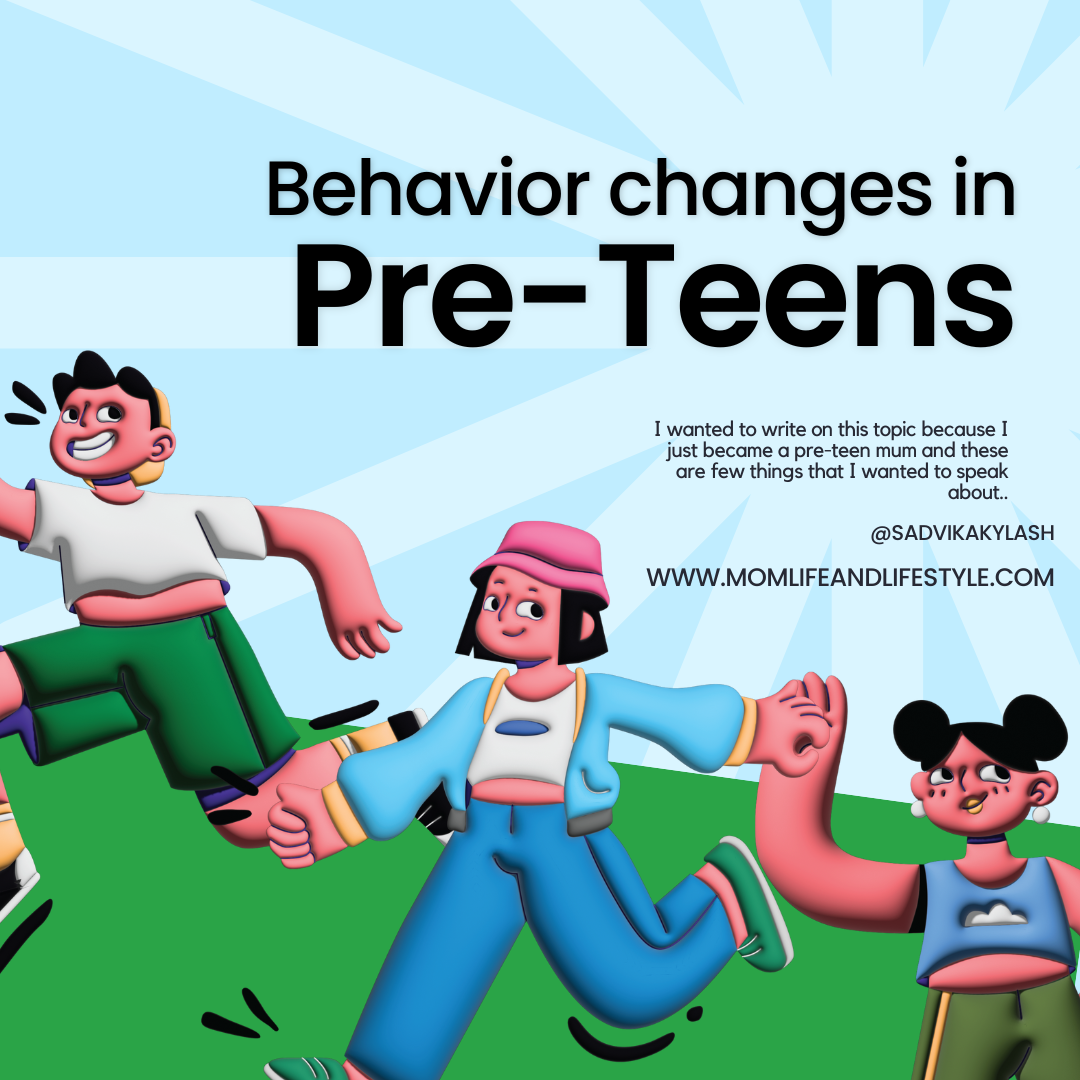PS: I wanted to write on this topic because I just became a pre-teen mum and these are few things that I wanted to speak about.
Pre-adolescence, or the pre-teen years (typically spanning ages 9 to 12), is a crucial developmental period characterized by numerous physical, emotional, and cognitive changes. Here are some common behavior changes observed during this stage:
Increased Independence:
Pre-teens often start asserting their independence, seeking more autonomy in decision-making and activities. They may challenge authority figures, such as parents and teachers, as they navigate their growing sense of self.
Peer Influence:
Peer relationships become increasingly important during pre-adolescence. Pre-teens may spend more time with friends, seeking acceptance and validation from their peers. This can influence their behavior, interests, and choices.
Mood Swings:
Hormonal changes during pre-adolescence can lead to mood swings and heightened emotional sensitivity. Pre-teens may experience rapid shifts in emotions, ranging from excitement and happiness to frustration and sadness.
Identity Exploration:
Pre-adolescence marks the beginning of identity exploration. Pre-teens may experiment with different interests, hobbies, and personas as they try to understand themselves and their place in the world.
Risk-taking Behavior:
Some pre-teens may engage in risky behaviors, such as experimenting with drugs, alcohol, or sexual activity. This can be driven by curiosity, peer pressure, or a desire for thrill and sensation-seeking.
Behavior changes in Pre-Teens

Body Image Concerns:
As physical changes occur, pre-teens may become more conscious of their appearance. Body image concerns, including worries about weight, height, and physical attractiveness, can emerge during this stage.
Social Comparison:
Pre-teens may engage in social comparison, evaluating themselves against their peers in various aspects such as academic performance, athletic ability, and social status. This can impact their self-esteem and confidence.
Increased Responsibility:
With growing independence comes increased responsibility. Pre-teens may take on new tasks and chores at home or exhibit a greater sense of accountability in school and extracurricular activities.
Desire for Privacy:
Pre-adolescents may crave privacy and personal space as they navigate changes in their bodies and emotions. They may withdraw from family members and seek solitude to process their thoughts and feelings.
Conflict with Parents:
Conflict between pre-teens and their parents is common during this stage. Differences in opinions, rules, and expectations can lead to arguments and power struggles as both parties adjust to shifting dynamics.
It’s important to recognize that every pre-teen is unique, and not all will exhibit these behaviors to the same extent. Additionally, supportive relationships with caregivers, open communication, and opportunities for self-expression and exploration can help pre-teens navigate this transitional period with confidence and resilience.
This blog post is part of the blog challenge ‘Blogaberry Dazzle’ hosted by Cindy D’Silva and Noor Anand Chawla in collaboration with Mads’ Cookhouse.
You can also read my other posts:
Things to Teach your Child as they Reach 8-10 years of age


What an insightful post. I didn’t realise the emotional changes of growing children. They really need to be handled with care.
As a middle school teacher, I see these changes firsthand every day. It’s a rollercoaster ride for sure, but it’s also such a pivotal time for growth and self-discovery. It’s all about understanding and supporting them through these changes, whether it’s offering a listening ear, providing guidance, or just being there to cheer them on.
I feel this is the time when parents needs to be more patient and understanding as these charges are inevitable in kids and a good communication can help half of the problems.
Oh yes, getting prepared to one at home who is on the way to teenage. Already I’m seeing most of what you’ve mentioned. Dreading this phase!
This is such a turbulent time for the parent and the child. They want to be assertive and they want to be free but the need to do that also means more care and caution. You have presented the emotional and behavioural changes in preteens and teens quite well, Sadvika.
This was such an insightful article. My son is 8 and I’ve already started noticing many changes in his behavior. I’ve started reading more on this topic so that I can support my child better through this transitional phase.
Sadvika this is indeed a topic which need to be discussed and shared by parents who are in the pre-teen kid parent group. Such discussions will actually help the going to be pre-teen moms /parents to handle the emotions, mood wings and other discussed changes in the behavioral and physical front of the child. As both of my mom’s kids were girls so me and didi never got the chance to see closely the pre-teen changes in a growing boy. But now I became the mother of a boy, I am really thoughtful and perhaps stressed too about how to handle the pre-teen years of my boy although he is too small now. I even talk to my husband on this topic and suggested that he should be the one to guide our boy during this impactful years of his life for a better and healthy growth and also guide me about what need to be done from my side to make this journey easy for the boy. This post of yours came at the very right time in my life and I am bookmarking it. Thanks for educating moms like me.
Same pinch Sadvika. I am also going through this phase. You mentioned relevant points. Sometimes I feel helpless and then I tried to calm myself. It is harmonal change that triggers most . Hope all parents handle this phase calmly
I was not aware that pre teens also have hormonal influences, I thot it was only with teenagers. Thank you for this insightful post Sadvika. btw, I have a teen n a pre teen????.
Of all the things you’ve spoken about, I feel risk taking is something we must be most watchful about as others are more or less natural tendencies, but if they get into dangerous company n stuff… it’s the scariest.
Pre teens I think it is the time that they want to talk their heart but will find it hard. Because it is because they are inbetween being a grown up and final phase of childhood. Thats a thoughtful post and will be of great help.
Intriguing and Insightful!
I am not a mother but have heard a lot of moms say that parenting a teen is like starting from scratch again. I am sure they would relate to your post and find it useful.
When you said, “With growing independence comes increased responsibility”, my mind immediately went to that dialogue from Spiderman, “With great power comes great responsibility”. Really insightful post for parents struggling with how to handle growing kids. As a preteen, I myself remember how difficult the transition was and I’m sure over the years with changing times and advancement in tech and other stuff, it must be even more challenging for today’s kids. In such a phase its so important to have the right kind of parental support and you’ve listed out everything so nicely, with apt examples.
I wonder how my parents dealt with this with no text/training around it during that period. Very helpful post.
I am writing a series on Adolescence for the A2Z and I feel the best way to handle this is with open dialogues and keep communication going all the time. Foster a trusting relationship with your child by showing genuine interest and creating a safe space for conversation. Whether it’s peer pressure or exploring physical changes and sex. I used to talk about it just like we used to talk about TV programs or games.
This is a much needed post for parents. So many changes occur which needs to be carefully handled
It is so important to pay attention to the changes as they can indicate evolving natures and personalities but also could flag potential problems or challenges they are facing.
My son is 8, I guess I must prepare for this new phase!